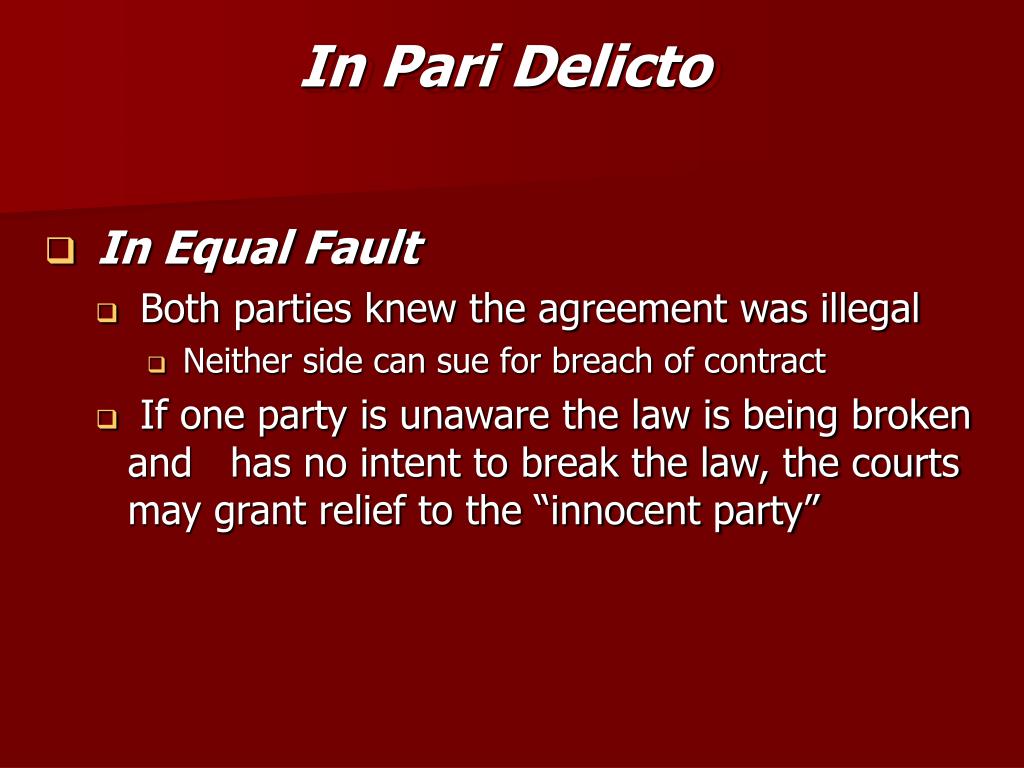Delve into the intricacies of legal proceedings and explore pertinent information regarding BRB publications public records and the influence of NCREIF on real estate investment trusts. In pari delicto—a legal doctrine steeped in Latin, meaning “in equal fault”—is more than just a dusty legal maxim. It’s a powerful defense that can determine outcomes in complex financial disputes, contract disagreements, and even personal injury cases. This article provides a deep dive into in pari delicto, unraveling its complexities and exploring its practical implications.
What is In Pari Delicto?
In pari delicto operates on a simple principle: if two parties are equally complicit in a wrongdoing, neither can seek legal redress from the other. The full Latin maxim, “in pari delicto potior est conditio possidentis,” further clarifies this, stating “in equal fault, better is the condition of the possessor.” So, if two individuals conspire to defraud investors and the scheme collapses, neither can sue the other for their losses. The courts will likely refuse to intervene, leaving the losses where they lie. This doctrine is rooted in common-law principles of fairness and judicial efficiency. Why should the court expend resources resolving a dispute arising from shared misconduct?
Exceptions to the Rule
While seemingly straightforward, in pari delicto is not absolute. Several exceptions exist that may permit legal action even when both parties share some degree of culpability.
The Adverse Interest Exception
This exception probably comes into play most often in cases involving agents acting against their principals. For instance, if an employee embezzles company funds for personal gain, the company may sue the employee even if the company itself bears some responsibility for negligent oversight, as demonstrated in SEC v. Lee. Judge Daniels’ opinion in this case offers a clear articulation of the doctrine: “To successfully apply the doctrine, the plaintiff must be an active, voluntary participant in the wrongful conduct, and the plaintiff’s wrongdoing must be at least substantially equal to that of the defendant…. Furthermore, under New York law, the doctrine of in pari delicto may be subject to the ‘adverse interest’ exception, which applies when an agent is defrauding the principal exclusively for the agent’s own benefit and to the [principal’s] detriment.”
The Innocent Insider Exception
This exception remains somewhat less defined. It suggests that if an “innocent insider” within an organization could have prevented the wrongdoing but didn’t, the in pari delicto defense might not hold. However, this exception remains subject to ongoing research and further clarification is needed regarding its consistent application and supporting case law.
Distinguishing In Pari Delicto
In pari delicto is often confused with related legal concepts, but important distinctions exist.
Contributory Negligence and Comparative Fault
Unlike in pari delicto, which focuses on shared participation in the same wrongful act, contributory negligence and comparative fault examine scenarios where someone contributes to their own harm. For example, slipping on a wet floor in a store is a case of negligence where the victim may have contributed to the incident.
The Unclean Hands Doctrine
While both doctrines address wrongdoing, in pari delicto requires equal fault in the specific act at issue. “Unclean hands,” however, casts a wider net, considering any prior misconduct by the plaintiff, even if unrelated to the current case.
Practical Implications and Future Trends
In pari delicto is particularly relevant in today’s complex financial landscape. The increasing prevalence of intricate financial instruments and transactions probably makes it more likely that multiple parties will be involved in potential wrongdoing. Furthermore, the rise of cybercrime and other technologically driven offenses presents new challenges in determining “equal fault,” suggesting that the interpretation and application of in pari delicto may continue to evolve.
| Feature | In Pari Delicto | Unclean Hands |
|---|---|---|
| Focus | Equal fault in the same wrongdoing | Any prior misconduct, even unrelated to the case |
| Parties Involved | Requires multiple parties involved in the same act | Applies to the plaintiff’s conduct only |
| Outcome | Prevents either party from seeking legal remedy | May prevent the plaintiff from prevailing |
Understanding in pari delicto is crucial for anyone involved in business dealings. It underscores the importance of ethical conduct and encourages thorough due diligence before entering into agreements. By prioritizing transparency and legal compliance, individuals and businesses can mitigate the risk of finding themselves entangled in a situation where shared wrongdoing bars access to legal recourse.
- How Many Days is 100 Years: Precise Calculation & Gregorian Calendar Nuances - March 15, 2025
- How Many Days in 100 Years: Precise Calculation & Gregorian Calendar Implications - March 15, 2025
- Explore White and Sea: A Comprehensive Overview - March 15, 2025
















